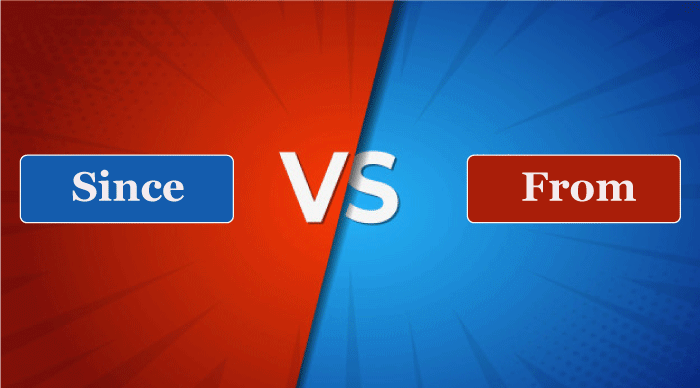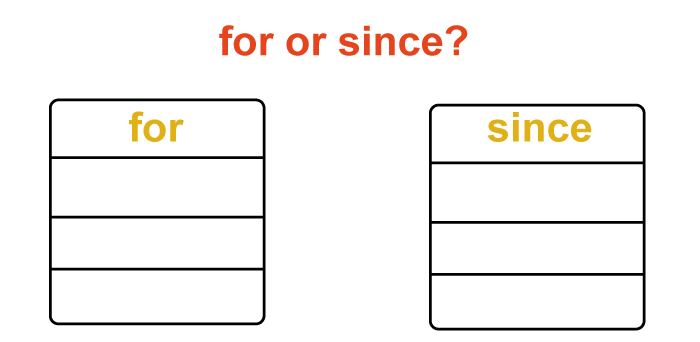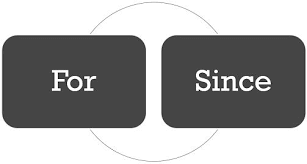Difference Between Since and ForFor non-native learners, learning the nuances and subtleties of the English language can take time and effort. Using "since" and "for" is one frequent cause of misunderstanding. Even though both terms are used to discuss time, their usage and potential meanings vary. This article will examine the distinctions between "since" and "for" and offer examples to help make sense of their usage. 
Since and For DefinitionLet's describe "since" and "for" first before discussing how they are used and how they differ:
Using SinceA starting point in time is indicated by the word "since," which has several distinct meanings. The word "since" is frequently used as follows:
Using "since" correctly is crucial to avoid ambiguity when indicating a specific starting place. Here are some pointers on how to use "since" in this context:
Examples
Since InstancesHere are some instances of the word "since" being used in various contexts:
Below is an elaborated version: 1. Describing a Cause-and-Effect ConnectionSince it is frequently used to convey a cause-and-effect connection, here are some pointers for phrasing this with "since":
Examples
2. Expressing Consent or Acknowledgment
Since it can also be used to express agreement or recognition, here are some pointers for phrasing this with "since":
Examples
3. Referring to a Current IssueSince it can also be used to describe an ongoing circumstance, here are some pointers for phrasing this with "since":
Examples
4. Providing a Justification or ReasoningSince it can also be used to give a justification or explanation, here are some pointers for phrasing this with "since":
Examples
Using ForThe preposition "for" designates a period. It can be applied in a variety of ways, including:
Indicating a particular period. The word "for" is frequently used to denote a period. Here are some pointers on how to use "for" in this manner:
Examples
For Instances Here are some instances of the word "for" being used in various contexts:
Below is an elaborated version 1. Describe a Task's intent Eg: "I'm studying for my exam." 2. Regularity The phrase "I work out at the gym for an hour every day" denotes a regular event. 3. The Act of Exchanging Something for Another Eg: "I traded my bike for a skateboard." Note: Be aware that the preposition "for" frequently precedes a duration, such as "an hour," "a week," or "five years." The Distinction Between Since and ForAlthough "since" and "for" are used to discuss duration, their usage and meanings are distinct. The main variations between the two are as follows: 1. Starting Point Versus Duration "Since" designates a particular moment, whereas "for" designates a period. 2. Time Reference "Since" is frequently used to denote a specific point in the past, whereas "for" typically denotes a period that begins in the past and goes into the present or future. 3. Cause-and-Effect Versus Purpose "Since" is frequently used to denote a cause-and-effect connection, whereas "for" is frequently used to denote an action's goal. 4. Occurrence Versus Agreement In contrast to "for," which is frequently used to denote the frequency of occurrence, "since" can convey agreement or introduce a reason. 
5. Particular Versus General "For" can refer to a general period, and "since" is typically used to refer to a particular occurrence or situation. The Significance of Properly Using Since and ForTo communicate in English clearly and effectively, you must use the words "since" and "for" properly. Confusion and misunderstandings can result from the improper use of these terms. For example, using "since" to show the duration of time instead of a starting point can make it unclear when an event started. It may not be obvious how long an event has occurred if the word "for" denotes the beginning rather than the end of something. Examples of Common Mistakes in Using Since and ForHere are some examples of common mistakes in using since and for: 1. Confusing the Meanings One common mistake is using since and for interchangeably. Since refers to a specific point in time while for refers to a period. For example, "I've been waiting since 3 pm" instead of "I've been waiting for 3 hours." 2. Incorrect Preposition Another mistake is using the wrong preposition. For example, saying "I've been studying since two hours" instead of "I've been studying for two hours." 3. Incorrect Verb Tense Another mistake is using the wrong verb tense. For example, saying "I've been knowing her since last year" instead of "I've known her since last year." 4. Missing Verb A common mistake is omitting the main verb after since or for. For example, saying "Since last week, raining a lot" instead of "Since last week, it has been raining a lot." 5. Using Since and For Together Another mistake is using since and for together in the same sentence. For example, saying, "I've been waiting since for 3 hours" instead of "I've been waiting for 3 hours." 6. Using Since and For with the Wrong Time Reference Another mistake is using since or for with the wrong time reference. For example, saying "I've been living in this city for 2020" instead of "I've been living in this city since 2020." To avoid these common mistakes, it is important to understand the correct usage of since and for and practice using them in different contexts. Using Since and For in Different Verb TensesHere are some examples of using since and for in different verb tenses: 1. Present PerfectIn the present perfect tense, we use since or forto describe actions or events that started in the past and continue up to the present. 
Examples
2. Past SimpleIn the simple past tense, we use since or for to describe actions or events that started and ended in the past. Examples
3. Present ContinuousIn the present continuous tense, we use since or for to describe actions or events that started in the past and are still ongoing. Examples
4. Past ContinuousIn the past continuous tense, we use since or for to describe actions or events that were ongoing in the past. Examples
It's important to practice using these prepositions with different verb tenses to improve your understanding and fluency in English. Common Idiomatic Expressions with Since and ForHere are some common idiomatic expressions with since and for: 1. Since Day One This expression means from the beginning of something. For example: "She has been working hard since day one of her new job." 2. For the Time Being This expression means for now or temporarily. For example: "I'm staying with my parents for the time being until I find a new place to live." 3. Since Time Immemorial This expression means since the beginning of time or a long time ago. For example: "The tradition of celebrating the harvest festival has been around since time immemorial." 4. For Good This expression means permanently or for a long time. For example: "He decided to quit smoking for good after years of trying to quit." 5. Since Ages/For Ages These expressions mean for a very long time. For example: "I haven't seen my best friend since ages" or "We've been waiting for ages for the train to arrive." 6. Since the Dawn of Time This expression means since the beginning of history. For example: "The debate about the meaning of life has been going on since the dawn of time." 7. For a Rainy Day This expression means to save something for a future time of need. For example: "I'm saving this money for a rainy day." 8. Since You Ask This expression means since you brought up the topic. For example: "Since you ask, I think we should postpone the meeting until next week." Overall, idiomatic expressions with since and for are common in English and can add richness and variety to your language use. Understanding and using these expressions correctly can also help improve your fluency and communication skills.
Next TopicDifference between
|
 For Videos Join Our Youtube Channel: Join Now
For Videos Join Our Youtube Channel: Join Now
Feedback
- Send your Feedback to [email protected]
Help Others, Please Share










